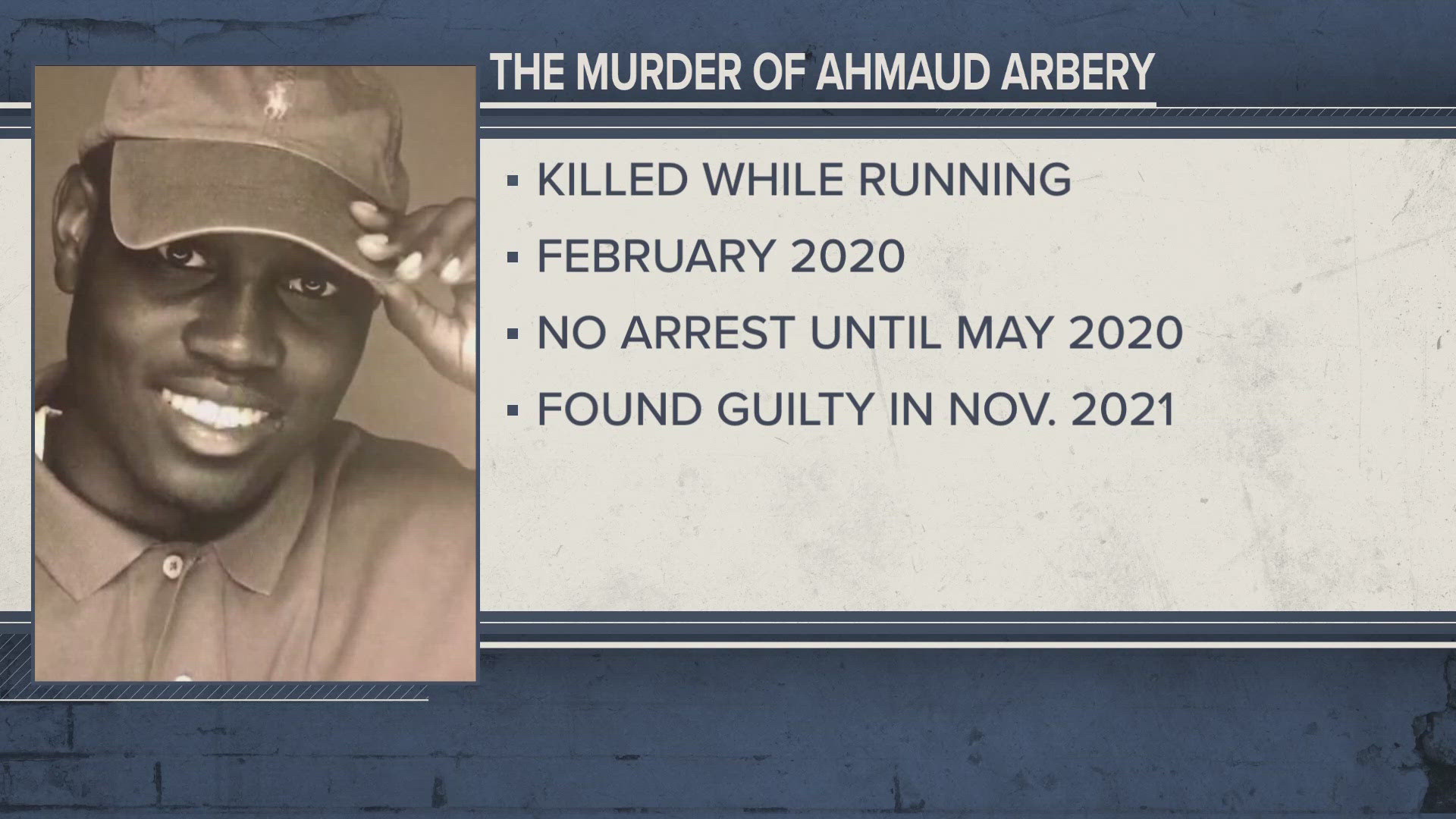BRUNSWICK, Ga. — The three men convicted of murdering Ahmaud Arbery will be sentenced for their federal hate crimes Monday.
They will each be sentenced separately, starting with Travis McMichael at 10 a.m., then Greg McMichael at 1 p.m. and William "Roddie" Bryan at 3 p.m.
A jury convicted all three in February of committing hate crimes, concluding they targeted 25-year-old Arbery because he was Black.
READ MORE: Timeline in shooting death of Ahmaud Arbery
The three men could get life in prison -- again.
All three men were convicted of murder by a state court jury last November and were sentenced to life. Almost two years to the day of his murder, in February, they stood trial again in federal court, with a jury convicting them of committing hate crimes.
The three men already have life sentences in state prison for Arbery's murder.
Travis and Greg McMichael were were sentenced without possibility of parole, but Bryan was given the possibility of parole.
Before court is in session Monday, here's what to know.
William 'Roddie' Bryan's attorney has asked for a lesser sentence than his co-defendants.
Bryan's attorney, J. Pete Theodocion, filed a last-minute motion Sunday asking that Bryan receive a lesser sentence than the McMichaels.
Bryan is asking that the court sentence him to a term of imprisonment less than a life sentence.
Theodocion is arguing that before the murder, Bryan only had only one criminal conviction for a DUI when he was 21, and one other arrest for marijuana, which was dismissed.
He says Roddie deserves a lesser sentence because the evidence introduced at trial presented the ugliest picture of Travis McMichael, not him, in terms of his social media and racist beliefs.
"Although there was unfortunate and embarrassing evidence in this regard introduced against Bryan, he submits that there was not the type of hatred in his comments as in those of his codefendants," Theodocion writes in the filing.
He says there are “clear distinctions” between the defendants when it comes to the crime.
Theodocian writes that there was was "no evidence Bryan intentionally selected a Black victim, or that he had any hate in his heart on that day."
Bryan “assumed the young man had committed a crime and thought he was doing the right thing by joining the chase,” because the first time he saw Arbery was as he was being chased and yelled at to stop, the filing says.
Theodocian says he would never have caused physical harm to Arbery
Bryan’s actions after the killing are also "noteworthy," Theodocian writes. He claims Bryan immediately told law enforcement that he had both the chase and the shooting on his cell phone.
He was the one who filmed it all and made it available to officers, offered his home security for review and sat for several voluntary interviews, the filing says.
Theodocian says there was evidence presented in court that showed Bryan didn’t know the McMichaels, didn’t communicate with them the day of the murder and didn’t know they were armed or would hurt Arbery.
Gregory McMichael’s attorney filed a motion for leniency in sentencing last week
Gregory McMichael's attorney, A.J. Balbo, filed a motion for leniency in sentencing last week. He cited Gregory’s cardiac issues, anxiety and “lifetime of public service” in the military and police department as reasons in the motion.
That motion asks for a lesser sentence of 20 years and asks that Gregory be allowed to serve his time in federal prison, saying his safety would be at risk in a state facility.
Judge Lisa Godbey Wood denied a similar request in a proposed plea deal earlier at the end of February, which would’ve allowed both McMichaels to serve the first 30 years of their sentences in federal custody.
Wanda Cooper-Jones, Arbery's mother, called the plea "ridiculous" and "disrespectful."
Arbery’s family says the deal offers the McMichaels leniency they don’t deserve.
Gregory McMichael’s wife also wrote a letter to Judge Wood, writing: “Please have mercy on Greg. His intention in this tragedy was not to hurt anyone.”
Travis McMichael’s attorney filed a motion asking that he go into federal custody
Attorney Amy Lee Copeland wrote in a court filing that Travis McMichael thinks he will be killed “upon delivery to the state prison system,” and has received more than 800 threats, some death threats.
The motion says threats include saying that his image has been shared throughout state prison system on contraband cellphones, people are "waiting for him," he shouldn't go into the yard, and that correctional officers promised willingness to keep backs turned so inmates can hurt him.
Motion also cites the Department of Justice Civil Rights division's investigation into Georgia prisons, which is investigating whether it provides prisoners reasonable protection from physical harm from other prisoners.
A legal expert told First Coast News that a judge doesn't have authority to move defendants to federal facility over state facility. It's up to the Bureau of Prisons to decide where the defendants serve their time, which will coordinate with the state agencies.
Travis and Gregory McMichael filed a motion to be acquitted of hate crime charges, but were denied
Judge Wood denied motions to acquit the federal hate crimes charges for Travis and Gregory McMichael in early August.
In a 27-page court order, Wood wrote, "because the evidence is more than sufficient to support their convictions, those motions are denied."
The McMichaels previously argued there wasn't evidence proving race was a motive and that the street where Arbery was killed isn't public, as necessary for conviction of interference of rights.
"They are wrong," writes Wood in the court order. "Most of (their) arguments either misconstrue the relevant statutory provisions or fail to properly apply the Rule 29 standard to the evidence. Thus, the McMichaels are not entitled to judgments of acquittal."
In addition, she writes, "...the amount and nature of derogatory racial evidence introduced at trial was stunning."
READ MORE: Acquittal motions denied



